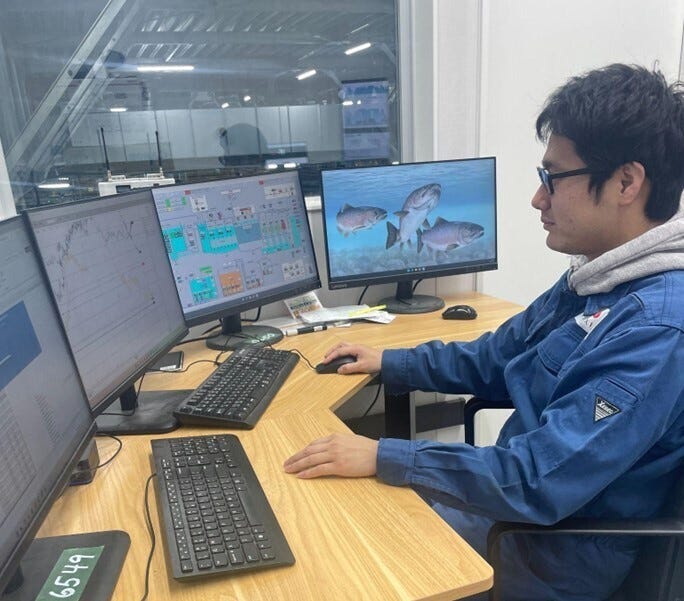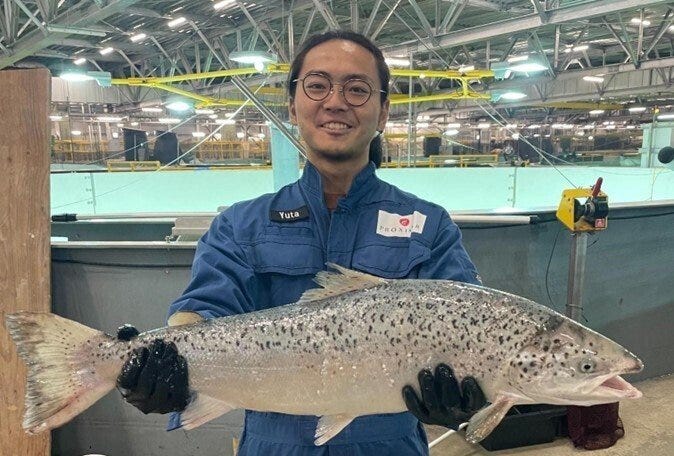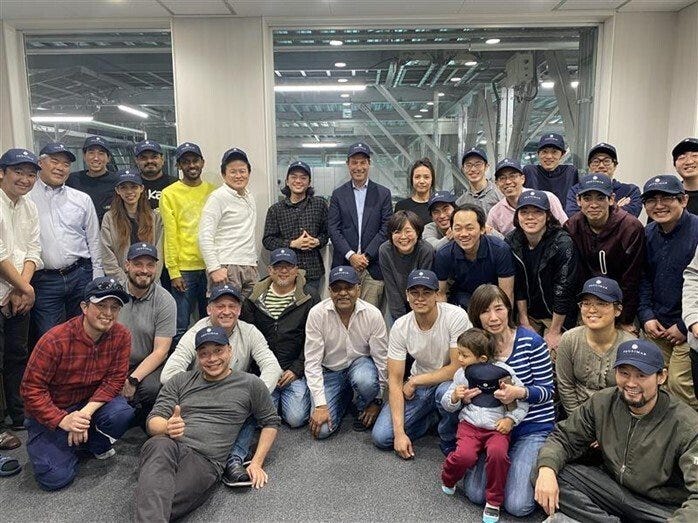Why We Invested in Proximar
ISSUE 5 | What Atlantic Salmon Aquaculture Has to Do with Wellness - Inside our 3rd Investment
🐟Why we invested in Proximar—Japan’s first land-based salmon aquaculture startup—and what it taught us about wellness equity and systems change.
🌱 Our Investment in Proximar: Wellness and Aquaculture?
SIIFIC Wellness Fund, managed by SIIF Impact Capital (SIIFIC), recently announced its third investment: Proximar Ltd., a company pioneering land-based Atlantic salmon aquaculture in Japan.
Globally, only a handful of companies have achieved commercial-scale success in land-based salmon aquaculture. Proximar is the first to do so in Japan. As global fish stocks decline due to climate change, Proximar's innovation points to a more sustainable seafood industry. With a goal of producing 5,000 tonnes annually, the company fits squarely within the fund’s impact thesis.
🧭 What Kind of Society Are We Investing In?
The SIIFIC Wellness Fund is built on a single “super goal”:
Wellness equity—creating a society where everyone can live better.
To reach this, we focus on two leverage points:
Improving wellness literacy
Strengthening social capital
These inform our Theory of Change and four core investment themes. The Proximar investment aligns with Theme 4:
Startups that create jobs in regional areas and foster vibrant, liveable communities.
So how does salmon aquaculture contribute to wellness?
Let’s unpack the logic, the learning, and the people behind our decision.
🏞️ Investing in Jobs That Make a Difference
Kazu: We look beyond decentralisation. We care about the quality of jobs—are they meaningful, fairly paid, skill-building, and community-rooted?
We applied rigorous impact due diligence to assess this.
Reiri: At first, I hesitated. Our previous investees—J-Pharma (cancer therapeutics) and Orthorebirth (artificial bone)—had direct health impacts. Proximar, on the other hand, is an aquaculture company.
From an ESG angle, it clearly made sense. But wellness?
Then I revisited our fourth investment theme. It’s not about what a company makes, but what kind of impact it generates. That clarity helped me move forward.
👩🔬 Field Story: From Hamamatsu to High-Tech Aquaculture
In 2023, Mr. Takahashi joined Proximar as a Biological Controller—a highly specialised role that requires deep knowledge of aquaculture science, fish pathology, water quality management, and biofiltration systems. His responsibilities include overseeing fish health, optimising feeding, managing stress levels, monitoring water conditions, and reporting data. The position demands university-level expertise in fisheries science, along with advanced technical qualifications.
Looking back on how he came to work at Proximar, he shared her story with an unmistakable sense of enthusiasm:
“In graduate school, I was researching feeding patterns in mackerel. After finishing my degree, I was working in aquaculture back home in Hamamatsu when I came across a news article about Proximar’s land-based salmon aquaculture using RAS (Recirculating Aquaculture Systems). I didn’t even know if they were hiring, but I reached out via the website anyway. I was drawn to it because it’s such cutting-edge work, and there’s no other place in Japan doing land-based aquaculture at this scale. I knew I had to try.”
“After joining, I was honestly surprised by how generous the salary and benefits were—it really felt like a European company. Taking a full week off is just normal here. That kind of work environment is rare in Japanese fisheries industry. The team is well-balanced between younger and more senior staff, and around 40% of the employees are international. We work closely together as a team, and I learn something new every day. I’m really glad I made the move.”
📷 Mr. Takahashi checks water quality at the Oyama facility. Courtesy of Proximar Ltd.
🧠 Systems Thinking: Understanding Social Capital
Nanako: Social capital is about trust and networks that enable people to act collectively. For three months, we debated whether creating jobs was enough to rebuild social capital in a rural area.
What helped was drawing a system map—a visualisation of causal relationships affecting rural employment, gender, youth migration and ageing in Oyama, Shizuoka.
In short:
Few local jobs for women
No visible role models
Young people leave
Ageing accelerates
Community networks weaken
We saw a hypothesis emerge:
Reforming how local companies operate could regenerate social capital.
If young people and women could build careers in the region, they’d form roots, energise civic life, and foster strong local ties.
🧭 We’re a Wellness Fund, Not a Healthcare Fund
Kazu: This was the moment we knew: it’s not the industry—it’s the structure of opportunity that matters. That’s what makes us a wellness fund.
We’ve built our Theory of Change into the fund itself. Each investment must align—not just in sector, but in systemic impact. This case reaffirmed that identity.
The system map we developed for this investment will now serve as a template for evaluating similar startups under Theme 4.
📊 Measuring What Matters: Our KPIs
Kazu Umeda:
At the centre of the system map is this:
“A workplace where employees gain skills, see career pathways, and feel secure about the future.” Such jobs are rare in rural Japan. That’s the core challenge.
We developed four impact KPIs:
Access to desirable work
Income opportunities
Challenge and growth
Opportunities to learn
Our baseline? Japan’s Regional Well-Being Index, published by the Digital Agency. This includes both objective data and subjective responses by municipality.
We’ll compare Proximar’s employee surveys to these public benchmarks to track progress.
🔁 From Company KPI to Social Capital Outcomes
Nanako: Most impact reports focus on product outcomes. But our Theory of Change is focused on the organisation itself. That’s why our final outcome isn’t a number - it’s the enhancement of social capital.
The Regional Well-Being Index includes questions about community connection and tolerance. We’re adapting those into staff surveys to measure long-term outcomes.
"Can a workplace improve a region’s trust, inclusiveness, and sense of belonging? We’re about to find out."
📈 Theory of Change – Theme 4: Creating Quality Jobs and Vibrant Local Communities
🏭 Technology, Talent, and Trust
Kazu: Proximar is a Norwegian-led venture that has brought state-of-the-art aquaculture technology to Japan. Their fully land-based farming system manages every stage of the salmon life cycle—from hatch to harvest—under one roof. A first for Japan.
Their production facility, based in Oyama, Shizuoka Prefecture at the foot of Mt. Fuji, was completed in autumn 2023. We began our due diligence at that stage, and despite the early phase, Proximar provided scientifically grounded forecasts and data. By autumn 2024, they successfully launched their brand: FUJI ATLANTIC SALMON, now sold through Marubeni Corporation and stocked in supermarkets nationwide.
📷 Atlantic salmon just before shipment. Source: Proximar Ltd.
🌍 Diversity, Capability, and Purpose
Reiri: At SIIFIC, we invest in what we call SEEDS—where Idea, Science, and Need intersect. Proximar embodies this philosophy, especially in how it attracts young technical talent through science and purpose.
“What draws people to this work isn’t where it’s located—it’s what it means.”
We saw a kind of diversity at Proximar that went beyond the surface—people of different genders, nationalities, and cultures working together in an open, multilingual space.
One powerful story came from a woman from Indonesia. After completing a postgraduate degree in fisheries science in Japan, she returned home—only to find that working in fisheries as a woman was virtually impossible due to physical labour and cultural norms.
“We finally get to use what we studied.”
— A Proximar employee, reflecting on why she returned to Japan to work in aquaculture
At Proximar, that’s not the case. The work is tech-driven and automated. "It feels like working at a software company," she told us, eyes shining. This is what happens when technology changes not only what we do—but how we live.
📷 Proximar’s diverse team at the Oyama facility. Courtesy of Proximar Ltd.
📈 Work That Aligns with Growth and Values
Nanako: Like Mr. Takahashi, she is using her academic background while building practical skills. That’s exactly the kind of growth our KPIs aim to track:
Work that aligns with personal purpose
Opportunities for challenge and development
Access to meaningful learning
Reiri: And from a compensation point of view, Proximar offers significantly higher salaries than the fishery industry standard in Japan. Their Scandinavian approach to work-life balance—such as generous leave—adds even more appeal. These conditions help explain why they’re attracting world-class talent.
🤝 Leadership That Gets It
Nanako: When we first explained our Theory of Change to Proximar’s leadership, we wondered how they'd react to KPIs not directly tied to salmon aquaculture business. To our surprise, they were enthusiastic:
“Creating environments where young people and women can thrive? Absolutely—let’s do it.”
They were already engaging with their local community: sponsoring town festivals, welcoming students for facility tours, and more.
“For kids, seeing a cutting-edge company thriving in their hometown, where people of all backgrounds work together—that’s powerful.”
Reiri: At a local job fair, we heard that a father actually encouraged his high-school son to consider Proximar. It showed us how trust is built not just through business—but through alignment with community values.
💡 Investor Contribution: Not Just Capital
Kazu: Since Proximar’s Japan operations are new, we will support them in developing internal employment policies aligned with our Theory of Change. This is our Investor Contribution—adding value beyond capital.
Reiri: To design these policies, we’re referencing B Corp certification frameworks—particularly:
Employee development and engagement
Diversity and inclusion in the workplace and community
They will not be aiming for certification yet, but these frameworks help them embed quality from the start. And it’s possible only because we did our financial due diligence properly. SIIFIC Wellness Fund invests in sound businesses—not just good intentions.
🌊 A Strong Financial Foundation
Kazu: Proximar has secured Japan’s first Blue Sustainability Loan, jointly financed by Mizuho Bank, Shizuoka Bank, and the Development Bank of Japan. We are proud to be their first venture capital partner.
🔁 From Unique to Replicable
Nanako: We don’t want Proximar’s success to be seen as a one-off. Yes, they benefit from advanced Norwegian technology—but our hope is that more startups and SMEs will emerge across regional Japan, creating environments where young people and women can thrive.
“If our system map, our support with policy development, or our Theory of Change can help another company do the same—we’ve done our job.”






